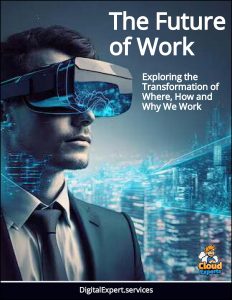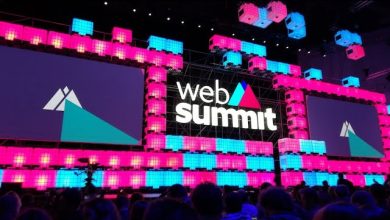 The ‘Future of Work’ is such a potent topic as it spans multiple dimensions, of a major evolution of cultural, business and technological trends.
The ‘Future of Work’ is such a potent topic as it spans multiple dimensions, of a major evolution of cultural, business and technological trends.
With the advent of the Metaverse our futures may see an entirely immersive virtual environment for our office work, a world where you could have a beach-side conversation with your colleagues, taking meeting notes while floating around a space station.
For more immediate, practical considerations there is the very tense tug of war between belief systems, between those that think working from home is an essential dynamic for modern organizations, versus those who insist it is still essential for employees to be present in the office.
Linkedin reported that the ‘Remote vs in-office battle continues‘.
The Future of Work
This is ‘The Future of Work’, referring to the ongoing evolution of when and where we work, and also how we work. This includes remote, virtual working from home rather than in the office, and also more dynamic employment models aka the ‘Gig Economy’.
It’s not a new idea, also back in 2004 Thomas Malone wrote about the coming Future of Work, and long before that the original visionary Charles Handy described how our employment will evolve to become ‘portfolio working‘. Malone said: “Imagine organizations where most workers aren’t employees at all, but electronically connected freelancers living wherever they want to.”
Handy offers a blueprint for how to practically structure such a virtual team that we will implement, describing a ‘Shamrock organization‘, and in this video talks about the key challenge to a human future of work, the changes we need to make to our education, and how we can engage with changing attitudes towards work and what that means for a purposeful life.
For some sectors like tech it’s increasingly becoming seen as the norm for an employed engagement; many leaders recognizing simple ideals like how remote workers outperform office workers.
However there is also a dark side to the trend. The Gig Economy promised a realization of a vision of a more flexible, rewarding working life where you enjoy more freedoms and choice, but has actually been described as a slave labour-like nightmare of even worse job insecurity, stress and anxiety.
Executive Strategy
McKinsey asks ‘What is the Future of Work?’ and explores a detailed analysis of these trends, where they foresee a decline in middle- and low-skill jobs such as food service, production work, or office support roles, with job growth concentrated in high-skill jobs, for example, in healthcare or science, technology, engineering, and STEM fields.
A few job categories could see more growth than others. The rise of e-commerce created demand for warehouse workers; investments in the green economy could increase the need for wind turbine technicians and aging populations in many advanced economies will increase demand for nurses, home health aides, and hearing-aid technicians. Teachers and training instructors will also continue to find work over the coming decade, while robotics used to process routine paperwork may lessen demand for some office workers.
They see a continuing adoption of remote working however suggest there are still limitations to this, where key activities like negotiations, brainstorming, and providing sensitive feedback are activities that may be less effective when done remotely. Therefore it’s best addressed through clear identification of the tasks best served by this approach, and employing approaches like ‘hybrid working’, recommending executives build strength in five areas:
- Expand executives’ focus on strategic clarity, coaching, and empathy. The leading driver of performance and productivity isn’t compensation or stretch goals but rather the sense of purpose work provides to employees.
- Foster outcome-based management of small, cross-functional teams. This is both more human and more effective as performance management practices shift from being about controlling employees’ work to empowering and enabling teams and people to perform.
- Increase talent velocity, especially with reskilling. Being able to staff teams across organizational siloes is a hallmark of agile models.
- Find new zero-cost, high-optionality ways to collaborate. It can help to define a model to increase how quickly your organization can discover and adopt better modes of collaboration, both physical and digital.
- Increase the rate of technology adoption. It’s imperative for companies to seek out new tech and use data to drive optimal results and make better decisions.
Most notably they emphasize the critical role of HR in leading this new culture and working models:
Although HR was once considered a stodgy support function, it’s now poised to serve as a strategic partner to the business, as relevant to success as R&D, sales, or production. But fulfilling that role will require nothing less than a transformation of HR itself.
As the workforce becomes increasingly global and virtual, organizations must adapt their employment and collaboration practices to meet the demands of the modern era.
With the rapid advancement of technology and the recent shift towards remote work, companies like Zoom have become instrumental in enabling seamless communication and collaboration, and so offer a unique perspective on the future of work and how it is shaping the way we work and collaborate.
AI Can Now Attend Zoom Meetings for You: The Advent of the Copilot Era
As the Washington Post reported Ai can now attend Zoom meetings for you, just one example of the primary feature of this trend, the era of the ‘Copilot’. These are Ai agents that can intelligently automate various aspects of your office work.
The Zoom AI Companion is a Generative AI Digital Assistant designed to simplify and streamline daily tasks. By leveraging AI technology, it can understand and respond to user commands, providing real-time assistance and information. It can help users boost their productivity by automating repetitive tasks and providing quick access to information, valuable time and effort, and can even send and receive messages, make phone calls, and even facilitate video conferences.
Gary Sorrentino, Global CIO for Zoom, shares Four Predictions for the Future of Work, describing that organizations will embrace hybrid working as the norm, Ai will be applied to automate repetitive meeting tasks and similarly the technologies for virtual meetings will become both smarter and more transparent.





This is a topic close to my heart cheers, where are your contact details though?
Very interesting information!Perfect just what I was searching for!
Thank you for the auspicious writeup. It actually used to be a amusement account it. Look complicated to far delivered agreeable from you! By the way, how could we keep up a correspondence?
Some genuinely nice and useful information on this site, as well I conceive the layout contains excellent features.
I just could not depart your website prior to suggesting that I actually enjoyed the standard information a person provide for your visitors? Is gonna be back often in order to check up on new posts
Thank you for sharing with us, I think this website really stands out : D.
Whats Taking place i am new to this, I stumbled upon this I have found It absolutely helpful and it has helped me out loads. I am hoping to give a contribution & aid different users like its aided me. Good job.
I have to express some thanks to the writer just for bailing me out of this problem. Right after browsing through the online world and seeing advice that were not productive, I believed my entire life was gone. Existing without the solutions to the difficulties you’ve resolved as a result of your good guideline is a serious case, as well as the kind which may have badly affected my career if I hadn’t encountered your website. Your primary understanding and kindness in taking care of everything was crucial. I’m not sure what I would’ve done if I hadn’t come across such a solution like this. I am able to at this point relish my future. Thanks very much for the high quality and results-oriented guide. I will not be reluctant to propose your web sites to any person who requires direction about this area.
Hello.This post was extremely motivating, particularly because I was investigating for thoughts on this subject last Saturday.
Do you have a spam problem on this site; I also am a blogger, and I was wondering your situation; many of us have developed some nice practices and we are looking to swap techniques with others, be sure to shoot me an email if interested.
Hi! I’m at work surfing around your blog from my new iphone 3gs! Just wanted to say I love reading your blog and look forward to all your posts! Keep up the fantastic work!
Hiya, I am really glad I have found this information. Today bloggers publish just about gossips and internet and this is actually frustrating. A good blog with exciting content, this is what I need. Thank you for keeping this site, I will be visiting it. Do you do newsletters? Can’t find it.
I believe this web site has got some very great information for everyone :D. “As ill-luck would have it.” by Miguel de Cervantes.